An IQ of 500 or 1000 would be a staggering leap beyond normal human intelligence, leaving you with hyperlogical thinking and unique problem-solving skills. Imagine possessing advanced creativity that connects ideas across different fields effortlessly. You'd have an astounding memory, allowing rapid learning and recall of vast information. However, such exceptional cognitive abilities could also lead to social isolation and emotional challenges. The implications of this extreme intelligence might even redefine our understanding of reality. Curious about how society perceives such brilliance and its potential impact on education? Stick around for more fascinating insights!
Essential Insights
- An IQ of 500 or 1000 would signify cognitive abilities far beyond normal human potential, indicating hyperlogical thinking and rapid problem-solving skills.
- Individuals with such high IQs could possess extraordinary creativity, enabling them to make unique connections and generate innovative solutions across various fields.
- Memory capacity would be vastly superior, allowing for the rapid learning and recall of extensive information with ease.
- The social implications may include extreme isolation and emotional challenges due to a lack of shared interests with others, leading to loneliness.
- Theoretical advancements could redefine understanding of reality, leading to groundbreaking inventions and breakthroughs in science and mathematics.
Understanding IQ Scores
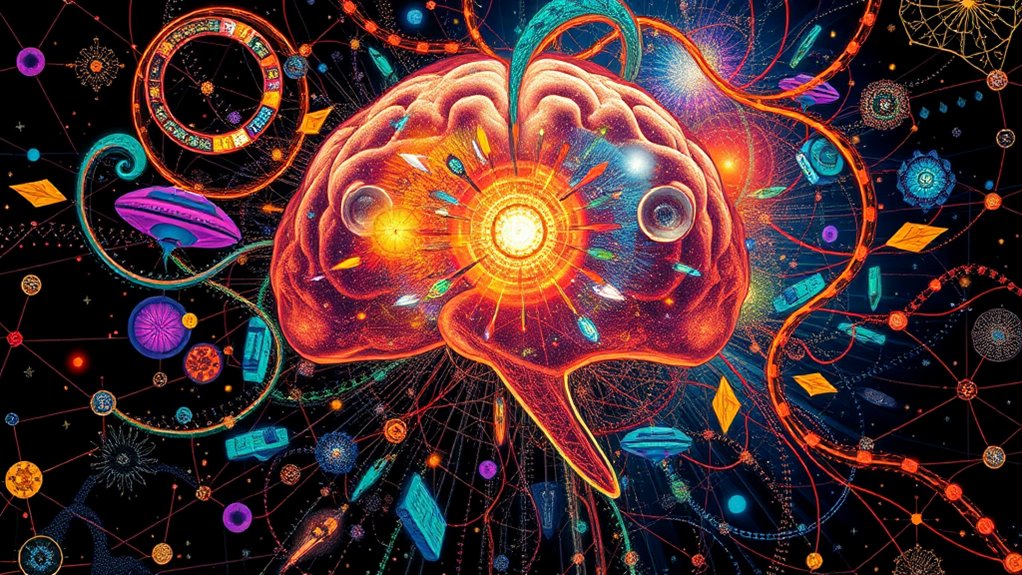
When you plunge into understanding IQ scores, you'll find they represent a person's intelligence on a standardized scale. The average score is set at 100, which indicates typical performance among a large sample of individuals. These scores measure cognitive diversity by evaluating various cognitive abilities—like verbal comprehension, working memory, and perceptual reasoning—providing an all-encompassing view of one's intellectual capabilities.
IQ scores follow a normal distribution, often visualized as a bell curve. Here, the majority of scores cluster around the mean of 100, with about 68% of the population falling between 85 and 115. This arrangement highlights the intelligence spectrum, showcasing how most people score within a predictable range while fewer individuals sit at the extremes.
Scores categorize intelligence levels: 90-109 is average, 110-119 is above average, and scores above 140 indicate genius levels. If you score above 130, you're among the top 2% of the population, illustrating just how rare higher scores are. Additionally, an IQ score of 100 is at the 50th percentile, meaning half the population scores at or below this level. This percentile ranking emphasizes the relative nature of intelligence, as it varies widely across different individuals.
IQ classifications fundamentally, understanding IQ scores helps you appreciate the complexities of human intelligence and the cognitive diversity that exists within society.
Theoretical Implications of High IQ

Exploring the theoretical implications of exceptionally high IQ scores, such as 500 or 1000, reveals a complex interplay between cognitive capabilities and various personal challenges. While one might assume that a high IQ guarantees success and well-being, the reality is often different. High IQ individuals face unique struggles that can complicate their lives.
- Mental health disorders, including anxiety and depression, are more prevalent among highly intelligent people.
- Physiological issues, such as allergies or autoimmune diseases, may arise due to chronic stress responses linked to their heightened cognitive activity. This is evidenced by the increased prevalence of inflammation-related conditions in high IQ populations.
- Social difficulties often manifest as isolation, as these individuals struggle to connect with peers who don't share their interests or perspectives.
- Decision-making can be hindered by cognitive biases, despite their advanced analytical skills.
Theoretical applications of high IQ could lead to extraordinary cognitive enhancements, but the accompanying challenges complicate this ideal. You might find yourself overanalyzing situations, ruminating on negative feedback, or feeling immense pressure to meet societal expectations.
The intricate relationship between high intelligence and mental health underscores that cognitive prowess doesn't shield you from emotional turmoil or social alienation. Understanding these implications is essential, as it reveals that while an IQ of 500 or 1000 could reveal unparalleled intellectual potential, it also carries risks that require careful management.
Consequently, nurturing mental health and seeking social connections becomes significant for anyone maneuvering the complexities of high intelligence.
Cognitive Abilities at Extreme Levels

Individuals with an IQ of 500 or 1000 consistently demonstrate exceptional cognitive abilities that far exceed typical human potential. Their extreme reasoning skills allow them to process complex information quickly and accurately, identifying patterns and relationships that others might overlook.
When tackling problems considered unsolvable, such as the Riemann Hypothesis, they employ hyperlogical thinking to generate innovative solutions.
In addition to mathematical prowess, they exhibit advanced creativity, often generating ideas that are both unique and groundbreaking. You might find them making connections between seemingly unrelated concepts, viewing challenges from multiple perspectives. This cognitive flexibility enables them to solve problems in ways others can't even imagine.
Their memory capacity is staggering; they can learn new languages and skills rapidly, recalling vast amounts of information with ease. Reading and memorizing lengthy texts in mere minutes is a common feat. However, this incredible cognitive ability can lead to cognitive overload, as the sheer volume of information can become overwhelming.
Despite these strengths, individuals at such extreme intelligence levels often face social isolation and emotional challenges. They may struggle to fit into society, leading to severe depression and difficulties in maintaining relationships. Additionally, individuals with an IQ above 130 often experience unique challenges in social settings, further complicating their interactions.
Their need for specialized educational and social environments can be essential for thriving. Ultimately, while they possess remarkable cognitive abilities, their journey can also be fraught with loneliness and complexity.
The Role of IQ Tests
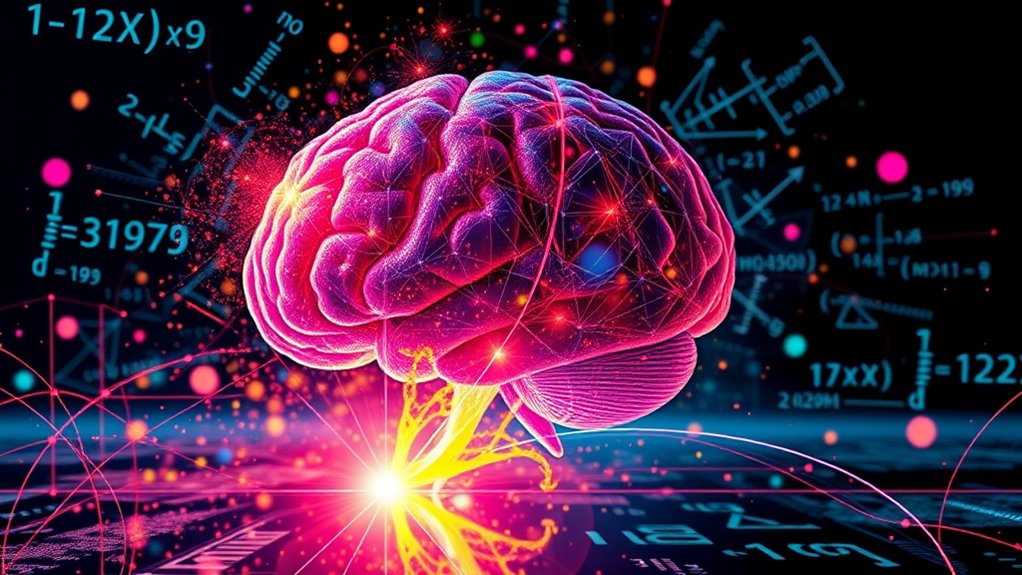
IQ tests play an essential role in evaluating cognitive abilities, helping to identify gifted individuals and support their educational needs. These tests serve multiple purposes across various settings, from schools to military organizations, examining both strengths and weaknesses in cognitive performance. However, it's vital to acknowledge that while IQ tests can be helpful, they also come with limitations, particularly regarding test reliability and cultural bias.
Consider the following roles of IQ tests:
- Identifying gifted children for advanced educational programs
- Evaluating intellectual deficiencies in military recruits
- Examining critical thinking and problem-solving skills in job recruitment
- Diagnosing learning and intellectual disabilities
Despite their usefulness, it's important to remember that IQ tests don't capture the full spectrum of human intelligence. They often focus on specific areas like verbal comprehension, perceptual reasoning, and quantitative analysis, leaving out other essential traits such as creativity and emotional intelligence. Furthermore, cultural bias can affect results, leading to unfair advantages or disadvantages based on an individual's background. Moreover, standardized tests are designed to ensure reliable assessment across diverse populations, further emphasizing the importance of context when interpreting results.
Ultimately, while IQ tests can provide valuable insights, they should be used alongside other evaluations to create a thorough understanding of an individual's cognitive profile. Being aware of their limitations allows you to make informed decisions and support individuals in a way that recognizes their unique talents and needs.
Statistical Limitations of IQ
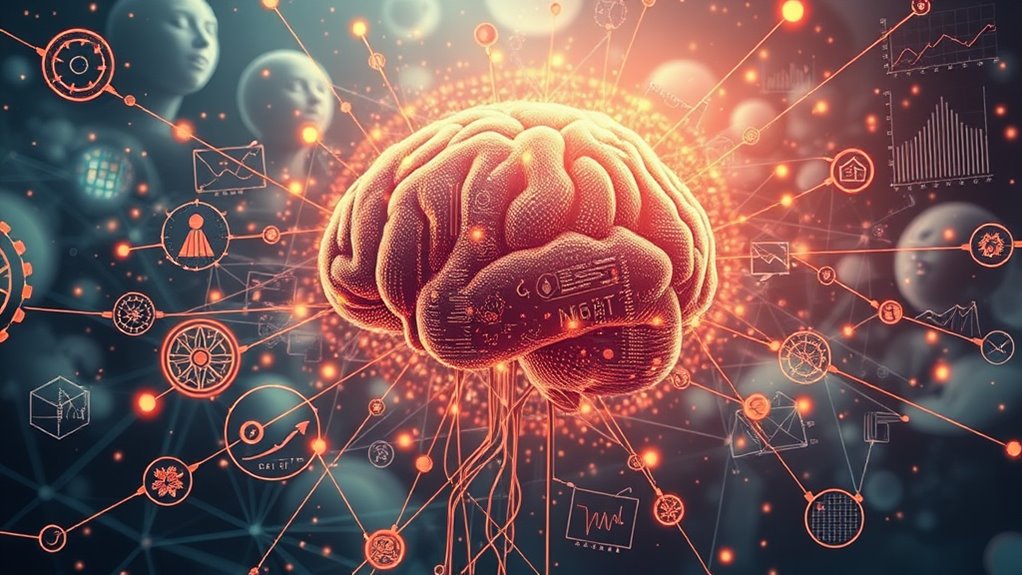
Understanding the statistical limitations of IQ reveals just how improbable scores like 500 or 1000 truly are. The normal distribution of IQ scores shows a mean of 100 and a standard deviation of 15. Consequently, an IQ of 500 would be over 26 standard deviations above the mean, a scenario that's virtually impossible.
According to probability theory, the likelihood of finding an individual with such a score in a population of 8 billion approaches zero. Current highest recorded scores hover around 230, making the concept of 500 or 1000 beyond human comprehension and unsupported by empirical evidence. Additionally, the cultural bias inherent in traditional IQ tests can further distort the representation of intelligence across diverse populations.
Measurement errors further complicate the reliability of IQ scores. Testing conditions, fatigue, or even psychiatric issues can skew results, so it's crucial to interpret scores with a confidence interval, typically plus or minus five points.
Remember, IQ tests measure relative intelligence, not absolute capability, and require proper analysis from qualified professionals to provide meaningful insights.
Moreover, traditional IQ tests are often plagued by cultural biases, which can misrepresent intelligence across diverse populations. These tests primarily focus on verbal and mathematical reasoning, neglecting other critical cognitive skills, including emotional intelligence and creative problem-solving.
Such narrow scopes don't account for the entire range of human intellect. When you consider these statistical anomalies and limitations, it becomes clear that claiming an IQ of 500 or 1000 isn't only statistically improbable but also fundamentally flawed in its measurement approach.
Human Cognitive Capacity
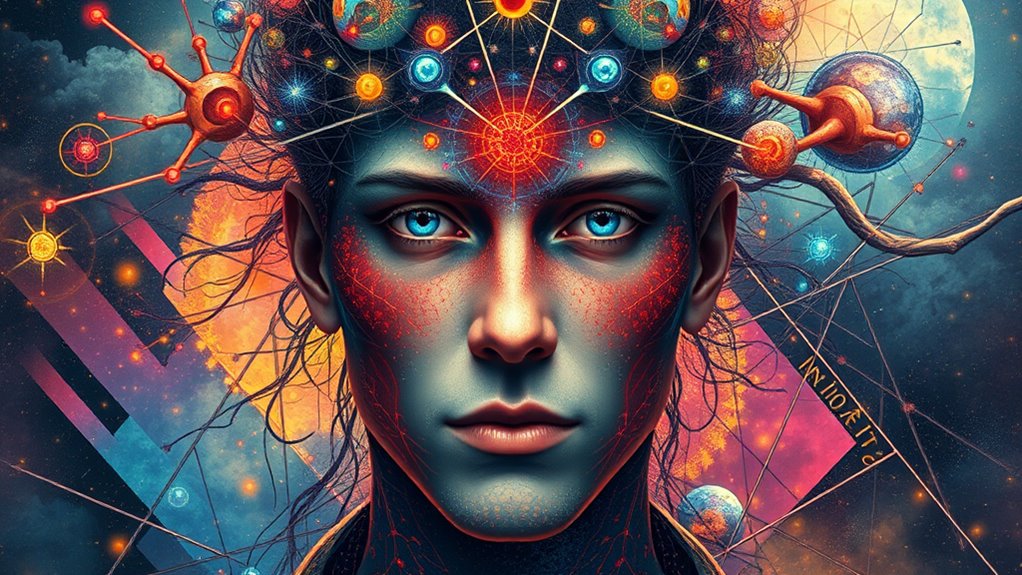
The improbability of extraordinarily high IQ scores highlights the need to explore human cognitive capacity more realistically. Cognitive capacity isn't just about raw intelligence; it involves the intricate dance of various cognitive skills that peak at different stages of life.
You might find it fascinating that:
- Fluid intelligence peaks around age 20, then gradually declines.
- Short-term memory improves until about age 25, only to begin its decline by age 35.
- Emotional evaluation abilities peak in your 40s or 50s.
- Crystallized intelligence, like vocabulary, can peak in your late 60s or early 70s, which reflects the importance of continuous learning throughout life.
Understanding these peaks can inform your perspective on cognitive enhancement and intelligence evolution. It's essential to recognize that cognitive limitations often arise from mismatches between external stimuli and your internal processing structures.
You might notice that switching between tasks can be surprisingly efficient; for instance, handling four tasks can be easier than managing just two, thanks to richer task representations.
As you navigate through life, the interplay of education and intellectual stimulation can greatly boost your cognitive abilities later on. This highlights the dynamic nature of human cognitive capacity and the potential for growth.
It's clear that intelligence isn't a static trait but rather a complex, evolving system influenced by various factors throughout your life. Embracing this complexity can lead to a deeper appreciation of what it means to be intelligent.
Redefining Intelligence Metrics

In today's rapidly changing world, redefining intelligence metrics is essential for capturing the true essence of cognitive abilities. The evolution of intelligence requires a shift from traditional assessments that measure fixed traits to dynamic assessments that reflect adaptive learning.
You need to understand that intelligence isn't just about memorizing facts; it's about synthesizing insights from experiences and adapting to new challenges.
Holistic intelligence encompasses systems thinking, enabling you to recognize connections between seemingly unrelated areas. Creativity measurement plays a critical role in this redefinition, as it highlights your capacity to innovate and explore.
By integrating feedback from various experiences, you cultivate problem-solving skills that are essential in real-world scenarios.
Current metrics often emphasize rote memorization, but this approach doesn't capture your ability to navigate complexity and uncertainty. Instead, consider alternative assessment methods like projects and portfolios that promote experiential learning.
These methods encourage deeper understanding and critical thinking, allowing you to demonstrate contextual understanding.
Dynamic assessment should focus on the processes you use to reach outcomes rather than the outcomes themselves. Incorporating self-assessment and peer-assessment can enhance objectivity and fairness.
By embracing these new metrics, you'll be better equipped to reflect your true cognitive abilities and adapt to the demands of an ever-evolving world.
Redefining intelligence means acknowledging that your learning journey is continuous and multifaceted, paving the way for a more thorough understanding of what intelligence truly means.
Current Testing Methods Explained
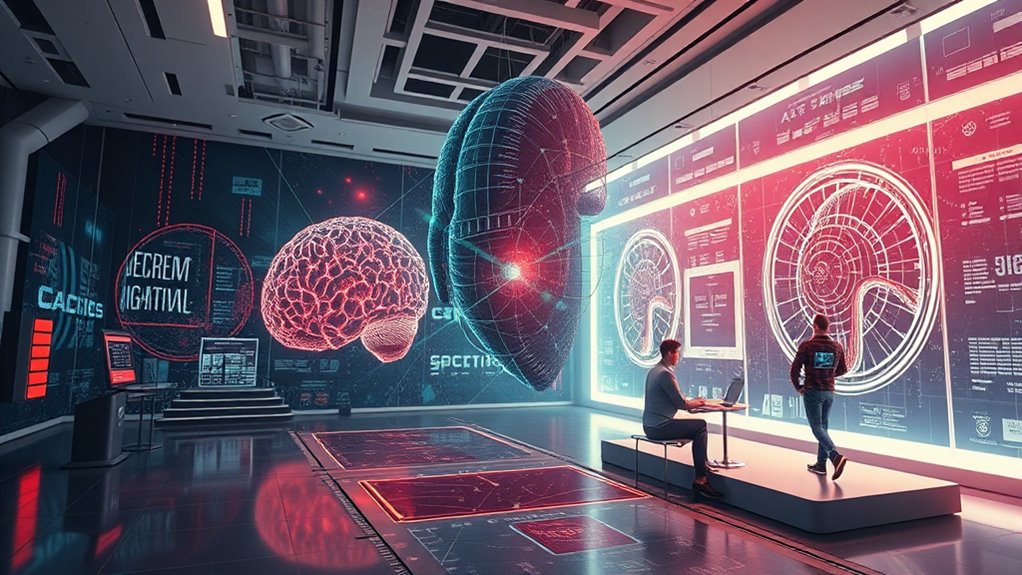
When it comes to evaluating intelligence, a variety of current testing methods are employed to assess different cognitive abilities. These tests utilize careful test design to guarantee accurate cognitive measurement across multiple dimensions, like logical reasoning, problem-solving, and verbal comprehension.
Depending on the specific test, you might find anywhere from 25 to 50 questions, with the whole process taking one to two hours.
Here's what you can expect from the testing process:
- Raw score calculation: Each question is assigned a point value based on difficulty, and your raw score is the total number of correct answers. However, these raw scores can't be directly compared across different tests due to varying difficulty levels.
- Normalization: To promote comparability, raw scores are adjusted using statistical methods. This step is essential for making sure your IQ score reflects your performance relative to a standard population.
- Standardization: Finally, normalized scores are converted into a standard scale, with the average set at 100. Most people score between 85 and 115, indicating that the majority fall within one standard deviation of the mean.
Speculative Scenarios of High IQ

Imagine possessing an IQ of 500 or even 1000; such extraordinary cognitive abilities could redefine your understanding of reality. You'd process complex information with lightning speed, solving problems that currently baffle the greatest minds.
With exceptional analytical skills, you'd easily identify patterns and relationships others might overlook, allowing you to tackle challenges from unique angles. Your superhuman creativity would enable you to generate innovative ideas, making connections across disparate fields—from science to art—and potentially revolutionizing entire industries.
However, this heightened intelligence brings significant social implications. You might struggle with social isolation, finding it difficult to relate to others on a cognitive level. Your profound emotional depth could lead to intense feelings, possibly triggering severe depression.
You might feel misunderstood, unable to share your complex thoughts with those around you, which could further alienate you. Living alone or in a specialized environment may become your reality, as the world mightn't be ready to engage with your extraordinary mind.
Daily life could involve performing intricate mental simulations, constantly seeking new sources of mental stimulation. Despite your thirst for knowledge, you might grapple with impulsivity, choosing immediate rewards over long-term gains.
This mix of brilliance and isolation would create a unique existence—one filled with endless intellectual pursuits but also profound loneliness. In this speculative scenario, your life would be a delicate balance between dazzling creativity and the challenge of meaningful human connection.
Historical Context of IQ Testing

The concept of measuring intelligence has evolved considerably over time, reflecting society's changing views on what it means to be intelligent. In the late 1800s, Sir Francis Galton first explored intelligence through physical characteristics and reaction times.
However, it was Alfred Binet's innovations in 1904 that truly transformed the field. He developed the first IQ test to help the French government identify children needing educational support. This early focus on children laid the groundwork for modern intelligence measurement.
As you investigate the historical context, consider these key developments:
- Binet's Innovations: Created foundational testing methods for evaluating cognitive abilities.
- Eugenics Influence: Early tests were sometimes linked to controversial eugenics movements.
- Testing Evolution: Intelligence assessments have progressed from simple metrics to complex evaluations.
- Cultural Biases: Ongoing debates highlight the need for fairness in testing across diverse populations.
Throughout the years, various contributors like William Stern, Lewis Terman, and David Wechsler expanded these cognitive assessments, refining techniques to include different aspects of intelligence.
Despite these advancements, controversies remain. Critics question the validity of IQ tests, pointing to cultural biases and the oversimplification of intelligence.
As you navigate this intricate history, it's crucial to recognize the social implications and ethical considerations surrounding intelligence measurement. Understanding these elements helps you appreciate the sophisticated landscape of IQ testing today.
Psychological Perspectives on Intelligence
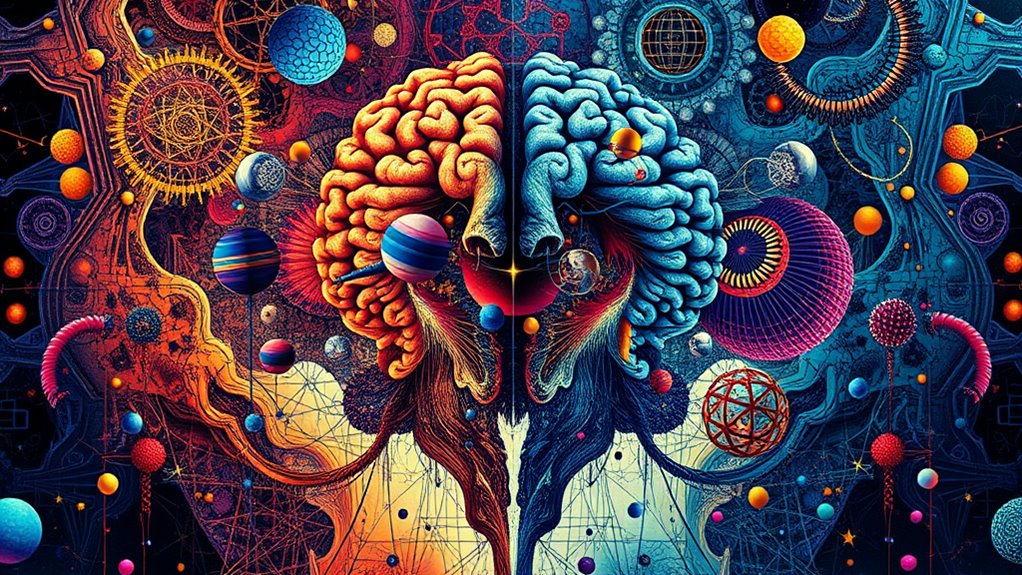
Intelligence isn't just a single trait; it encompasses a range of abilities and perspectives that psychologists have long sought to understand. Various psychological frameworks help you appreciate the complexity of intelligence.
Psychometric theories, for instance, utilize statistical methods to identify underlying factors of intelligence, highlighting the general intelligence factor (g) that relates to abstract thinking and adaptability.
Cognitive frameworks focus on mental processes like learning and problem-solving. The triarchic theory distinguishes analytical, creative, and practical intelligence, reminding you that intelligence isn't solely about academic prowess. Each type contributes uniquely to how you navigate the world.
Biological influences also play a vital role. Researchers examine neural mechanisms and brain structures linked to intelligence, showing that both genetics and environment shape your cognitive capabilities.
Neuroplasticity allows for adaptability, meaning your brain can change and grow in response to experiences.
Cultural variations further complicate the definition of intelligence. Different cultures prioritize diverse abilities, and Howard Gardner's theory of multiple intelligences identifies eight distinct types, including kinesthetic and existential intelligences.
This perspective emphasizes that intelligence adaptations can vary widely based on context.
Historical perspectives on intelligence testing have shaped current understandings and concerns over test validity, particularly when discussing extreme intelligence.
Ultimately, recognizing these diverse psychological perspectives enriches your understanding of what intelligence truly means in a multifaceted world.
Impacts on Society and Education

High IQs, such as 500 or 1000, would shake up both society and education in profound ways. You'd witness an educational landscape transformed by the needs and abilities of these exceptionally intelligent individuals.
Traditional teaching methods would no longer suffice; instead, educational innovations would emerge to cater to their rapid learning and advanced knowledge retention.
- Specialized programs tailored to individual capabilities would become essential.
- Early mastery of complex subjects would redefine educational milestones.
- Innovative contributions to curricula could revolutionize how we approach learning.
- Exceptional problem-solving skills could lead to groundbreaking advancements.
In society, the impact would be equally significant. Individuals with such high IQs would likely ascend to leadership roles across diverse fields, driving societal transformations.
Their ability to solve complex problems could lead to innovative solutions for pressing issues like climate change or healthcare challenges. You might find them influencing policy and governance, ensuring decisions are informed by exceptional analytical skills.
Moreover, their contributions to the arts and humanities would enrich culture, fostering a renaissance of creativity. As role models, they'd inspire future generations to pursue advanced education, promoting a culture of excellence.
The ripple effects of their presence would challenge conventional wisdom and push humanity forward, leading to a society that values innovation and aims for improvement.
The world would need to adapt, and you'd be part of that evolution, witnessing firsthand the profound changes brought about by such extraordinary minds.
Science Fiction vs. Reality
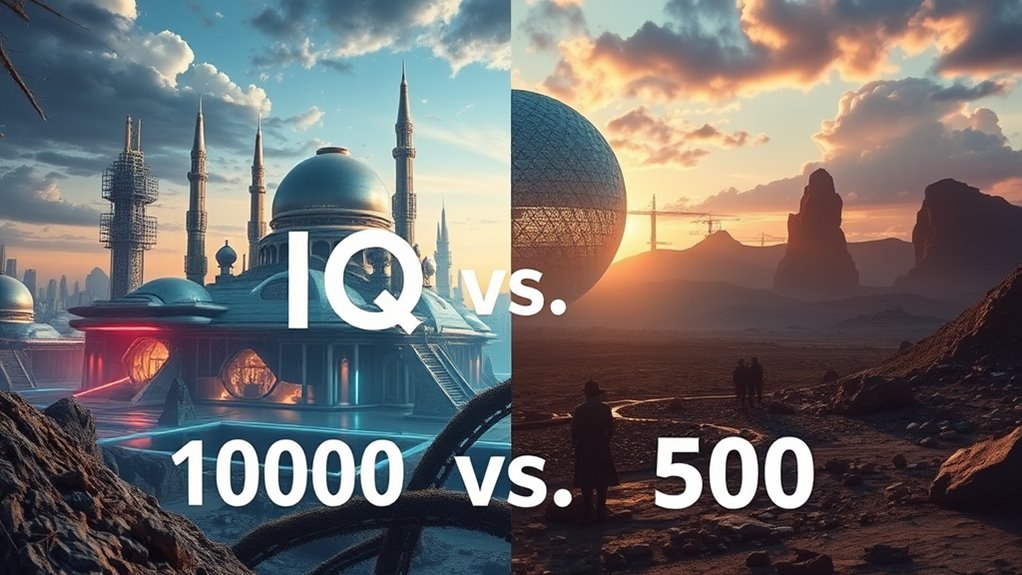
While society and education would undergo dramatic changes due to the presence of individuals with extraordinarily high IQs, the way these abilities are portrayed in science fiction often blurs the lines between fantasy and reality. In films like "Limitless," characters exhibit superhuman capabilities, showcasing enhanced memory and rapid learning that seem unattainable.
You might find it intriguing how science fiction explores AI intelligence, where enhanced cognitive abilities propel societal advancements, much like Isaac Asimov's "Foundation" series.
However, the reality of such intelligence raises complex ethical considerations. Genetic engineering could hypothetically create humans with IQs of 1000 or higher, but this opens up a Pandora's box of societal impact. You'd likely face isolation challenges, as individuals with extreme intelligence often struggle to connect with others, leading to loneliness and depression.
Science fiction reflects this, portraying the psychological burdens that come with such extraordinary abilities.
On the flip side, these individuals could drive creative innovations, solving problems deemed unsolvable today. Imagine the breakthroughs they could achieve in renewable energy or medical fields.
Yet, the question remains: would the benefits outweigh the societal costs? As you ponder these themes, it becomes clear that while science fiction provides an engaging lens to explore the implications of cognitive enhancement, the truth might be more nuanced and challenging than the narratives suggest.
Exploring Extreme Cases of Intelligence
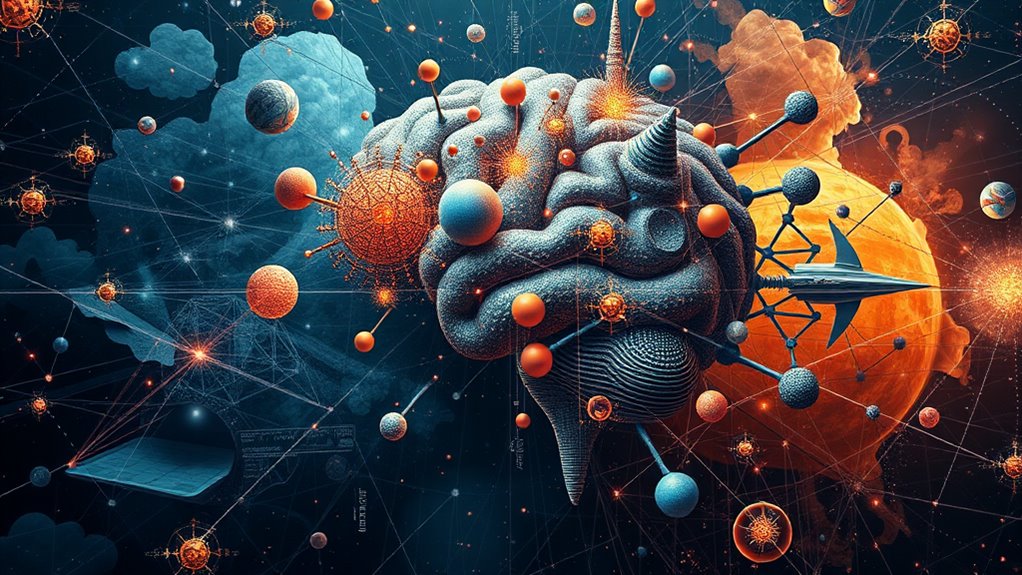
Many people wonder what it would be like to possess extreme intelligence, especially at levels like 500 or 1000 IQ. It's fascinating to think about the potential of extreme cognition, where you might achieve mathematical breakthroughs previously deemed impossible, like solving the Riemann Hypothesis.
You'd likely experience superhuman reasoning, processing complex information faster than anyone else, and making connections across diverse fields effortlessly.
Consider the implications:
- Innovative inventions that could revolutionize technology.
- Unparalleled creativity allowing you to generate unique ideas and perspectives.
- Exceptional memory, letting you recall vast amounts of information instantly.
- Psychological challenges, such as social alienation, stemming from feeling disconnected from others.
But with this extraordinary intelligence comes a heavy burden. You might find yourself as an isolated genius, grappling with cognitive dissonance when trying to relate to those around you.
The pressure of your abilities could lead to anxiety and stress, especially if you hold yourself to impossibly high expectations. The loneliness of your unique perspective might even trigger severe depression.
In a world where ordinary conversations seem mundane, the weight of your mind might feel suffocating.
While the allure of extreme intelligence is intriguing, it also brings profound psychological challenges. You'd need to navigate this complex landscape, balancing your exceptional abilities with the emotional toll they exact.
Future of Intelligence Assessment

As we look ahead, the future of intelligence assessment is rapidly evolving, driven by groundbreaking technologies and innovative methodologies. You'll find that digital assessment tools, like IBM's Skills Gateway, are personalizing evaluations to better gauge your abilities while recommending tailored training programs. These platforms have greatly boosted employee engagement with learning initiatives by 40%, fostering talent development in the process.
With the integration of artificial intelligence, assessments are becoming more adaptive. AI-enabled testing tailors questions based on your responses in real time, enhancing critical thinking and problem-solving skills through immersive, scenario-based training. This approach not only refines talent acquisition strategies but also guarantees that assessments are dynamic and responsive, aligning with your unique cognitive evolution.
Big data analytics further amplifies the effectiveness of these assessments. By processing vast amounts of information, they enhance the accuracy and efficiency of intelligence evaluations. As you engage with these advanced technologies, you'll find that they not only identify skill gaps but also provide insights for both learners and educators.
Evolving methodologies are shifting the focus from traditional standardized tests to dynamic assessments that value creativity, emotional intelligence, and collaboration. Virtual and augmented reality are now integral parts of these assessments, simulating real-world challenges and fostering practical application of knowledge.
As a result, you can expect a more inclusive and culturally sensitive approach to intelligence assessment in the future.
Frequently Asked Questions
Can Someone With an IQ of 500 or 1000 Exist Today?
You can't realistically expect someone with an IQ of 500 or 1000 to exist today.
Genetic limitations and the structure of the human brain impose strict boundaries on cognitive abilities.
The theoretical implications of such high IQs are staggering, as they exceed any known human capacity for intelligence.
Even the highest recorded IQ falls far short, emphasizing that these figures aren't just improbable; they're fundamentally unattainable within our current understanding of human potential.
What Would Daily Life Be Like for Such a High-Iq Individual?
Imagine your daily life filled with endless cognitive processing, where social interactions become a chess game of wits. You tackle problems others find impossible, yet you crave genuine connections.
Ironically, while you might solve complex equations effortlessly, small talk feels like a foreign language. You structure your days around learning and creating, all while steering through the fine line between innovation and isolation, as your exceptional mind dances between brilliance and loneliness.
How Would Society Function With Individuals of Extreme Intelligence?
If society had individuals with extreme intelligence, you'd witness significant cognitive disparities that would require societal adaptation.
Traditional systems might crumble under the weight of their advanced thinking. To facilitate integration, you'd need specialized educational programs and environments that cater to their unique needs.
This adaptation could lead to groundbreaking innovations, but it would also challenge social norms and perceptions, fostering both awe and alienation among the general population.
What Careers Would Be Suitable for Someone With an IQ of 1000?
If you'd an IQ of 1000, you'd thrive in genius professions that tackle the most complex intellectual challenges.
You could lead groundbreaking scientific research, solve unsolved mathematical problems, or innovate in engineering and technology.
Your ability to process vast amounts of data would make you a master in data analysis and financial forecasting.
Additionally, you'd excel in creative fields, crafting revolutionary designs and writing insightful literature that pushes the boundaries of human thought.
Would Education Systems Change for Individuals With Such High IQ Scores?
If you were to step into the domain of extraordinary intelligence, education systems would surely transform into a vibrant tapestry of specialized curriculum and individualized learning.
You'd find tailored programs designed to spark your curiosity and challenge your mind. Teachers trained in your unique needs would create an engaging environment, ensuring you're never bored.
With flexible approaches, you'd thrive, connecting with peers who share your exceptional abilities and interests. Your educational journey would be nothing short of exhilarating!
